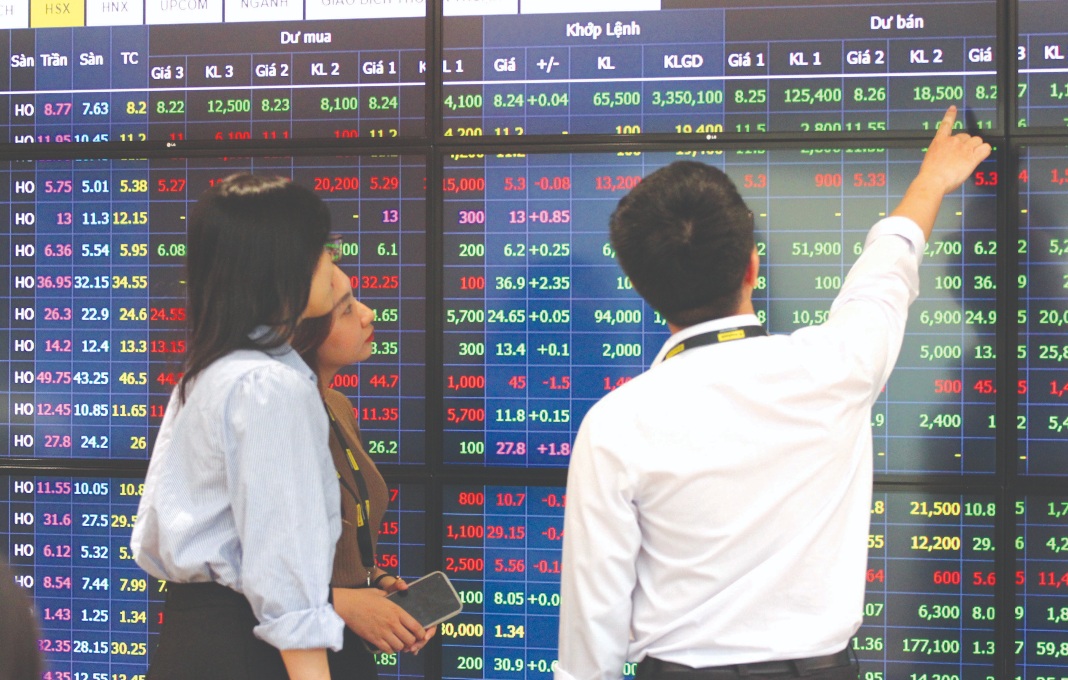Contrary to expectations, the stock market has remained lackluster since the State Bank of Vietnam (SBV) lowered key interest rates in late May.
U.S. debt factor
The SBV announced its decision to cut policy interest rates again on May 23, marking the third rate reduction since mid-March. But that day the VN-Index ended the session with a nearly eight-point drop from its peak. A similar scenario happened the following day, with the VN-Index closing down, even though there were brief upswings.
In the remaining sessions of the week, the market mostly moved sideways within a narrow range, with proprietary trading companies and foreign investors remaining net sellers. For example, during the last session of the week on May 26, these two groups of traders were net sellers with a respective value of VND70.3 billion and over VND244 billion.
This development suggests that the interest rate cut by the central bank has not had a significant impact on the current stock market trend. In fact, some investors have used the news as an opportunity to sell their shares. The market had already factored in the interest rate cut, so its short-term effect has been limited. Furthermore, the woes faced by the Vietnamese economy are partly due to the downturn in the economies that are Vietnam’s major trading partners, which cannot be fully resolved by interest rate cuts alone.
The recent stock market movements may have been triggered by concerns of a potential default in the U.S., which could have negative effects on the global financial market. When U.S. President Joe Biden and Speaker of the House of Representatives McCarthy reached a preliminary agreement on the debt ceiling on May 27, the VN-Index gained 12 points on May 29. Securities companies specializing in proprietary trading and foreign investors became net buyers again, with a respective value of VND338 billion and over VND123 billion on the HOSE alone.
Other concerns
Analysts also believe that if the U.S. debt ceiling agreement becomes valid, it could provide the U.S. Federal Reserve (Fed) with another reason to raise interest rates. The next policy meeting of the Fed is scheduled for mid-June, which has left many investors anxious about a potential interest rate hike. Although there have been indications that the roadmap for monetary tightening has come to an end or will change direction soon, the probability of the Fed raising interest rates in June, as updated by the CME FedWatch Tool on May 30, has shot up to 63% from just 25.7% the previous week.
The minutes of the May meeting showed that Fed officials had different views on the direction of interest rates in the coming months. Even Wall Street leans towards the scenario of the Fed raising interest rates next month, as it is unlikely for the U.S. central bank to lower interest rates this year.
Inflation in the U.S. is still above the 2% target while unemployment has slid to its lowest level since 1969 at 3.4%. Most Fed officials acknowledge that inflation remains too high, and they believe that higher interest rates could help alleviate inflationary pressure on the economy.
St. Louis Fed President James Bullard even expects the Fed to raise interest rates two more times this year to rein in inflation. However, some members, including Fed Chairman Jerome Powell, hold the view that interest rates may be kept unchanged to assess the impact of previous rate hikes and tensions in the banking sector.

Another concern is the rapid rise in bad debt in the Vietnamese economy, coupled with the increasing number of companies exiting the market, which is adversely affecting investor sentiment. Problems in the real estate sector are also being addressed, evidenced by the recent charges filed against illegitimate property projects involving certain listed companies.
Furthermore, the reemergence of tensions over the East Sea may negatively impact the stock market, as it is highly sensitive to geopolitical developments. Vietnam has recently voiced objections to China’s infringement on its exclusive economic zone.
Despite these concerns, it is undeniable that the Vietnamese economy is showing signs of improvement. Monetary and fiscal policies have been expanded to support the economy, and the significant drop in interest rates has brought risky investment channels such as securities into the spotlight again. Therefore, medium- and long-term investors may still be looking for opportunities to accumulate more stocks during any market corrections.











